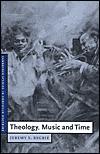 Having spent some time earlier posts on Bauckham's matters of History and particularity in Bible and Mission. I now wish to retrun and develop from there some other thinking that has been spurred on again from what I have read in Chris Erdman's Blog. There you will find wrestling with the future-past dynamic and matters of Jazz! Take a look.
Having spent some time earlier posts on Bauckham's matters of History and particularity in Bible and Mission. I now wish to retrun and develop from there some other thinking that has been spurred on again from what I have read in Chris Erdman's Blog. There you will find wrestling with the future-past dynamic and matters of Jazz! Take a look.
Therefore I want to move on beyond historicity matters to our consideration of that dynamic which I would suggest is significant ot the mission of the church today. Indeed, it has been a concern in recent years for me that in church planting and now I suppose in emergent church contexts that we can do much without reflection upon things and we betray any praxis. I other words we need to think and reflect theologically and upon practice.
So.... I want to take some time to begin to develop some initial thoughts that have been with me for some time now, but held back on. It may not be knew, that's not the point, rather i want to make sense of the mission ecclessiology of today and that requires me to engage in matters of time and space/place dynamics. It requires some eschatological approach. I want to therefore begin with Jeremy begbie in the next wee while and go on to explore the improvisation issues from there as we may learn from within the metaphor explored in Organisational Science.
 INTRO...
INTRO...
Into the dislocations of our times as we experience them, we may usefully place Begbie's explorations[i] into the ways musical phenomena can open up some of the central themes of the Christian faith - in particular those which are formative of an emerging missionary church - and in doing such theology, offer refreshing new models, as well as release faith from the damaging habits and dominance of tradition(s) and thought which have hindered and hampered its work in the past. In other words, in this transitional period, Begbie makes a beginning to challenge the church to engage in doing theology which is in touch with the temporal context and the zeitgeist, therefore seriously offering a way through this inter-phase from modernity to post-modernity, which further permits us to engage with relevance in our mission task.
It is in relation to issues of boundary and change[ii] at this threshold that I wish to critically review Begbie's work. While there are deficiencies due to the boundary constraints of literary conformity, he does encourage us to utilise our imaginations and do 'theology through music.'(4)[iii] Begbie's concern with the temporality and practice of music are useful in the paradigm shift from the tidy efficiency and linearity of modernity to intentional engagement with the pure escapism of postmodernity. Music's time and practice help shape our mission praxis as embodied action and participation in Christ as a dynamic or gravitational field 'which draws us in, we participate in a process, a journey in and through sound.'(18).
Footnotes
[i] The purpose he sets before us, is to allow music to serve, enrich and advance theology in relation to our understanding of God, God's relation to us and the world. More particularly, to do theology 'through music'(4) and in so doing expands and heightens sensitivity to the theological dimension of social and cultural thought and practices.
[ii] Music shows us in a particularly potent way that dynamic order is possible, that there can be ordered being, and becoming, form and vitality, structure and dynamics, flux and articulation. For something to be subject to persistent change need not imply disorder. (86)
[iii] Begbie does state that 'This book is only a preliminary attempt to address this issue.'(4) I would suggest that while it demands a great deal of intense reading, even without a deep musical understanding, I did find it possible to enter a dialogue as reader with the text in a way that used my imagination to carry out the theologising that Begbie did seem to do very little of, yet needed to do.